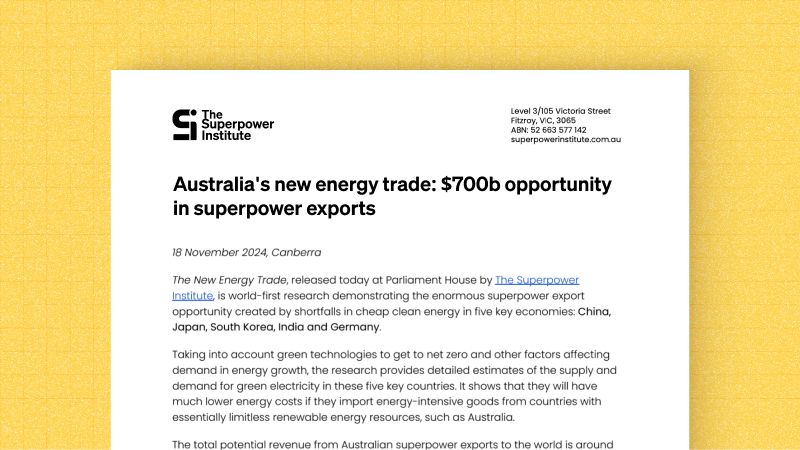The New Energy Trade, released today at Parliament House by The Superpower Institute, is world-first research demonstrating the enormous superpower export opportunity created by shortfalls in cheap clean energy in five key economies: China, Japan, South Korea, India and Germany.
Taking into account green technologies to get to net zero and other factors affecting demand in energy growth, the research provides detailed estimates of the supply and demand for green electricity in these five key countries. It shows that they will have much lower energy costs if they import energy-intensive goods from countries with essentially limitless renewable energy resources, such as Australia.
The total potential revenue from Australian superpower exports to the world is around $700 billion at today’s levels of industry output - or $1 trillion at forecast 2060 levels of output. This is six to eight times larger than typical revenues from Australian fossil fuel exports.
The extensive modelling and research makes Australia’s superpower export opportunity clear given the net zero commitments of these five select countries.
Major findings include:
- When deployed at scale, clean energy demand in China, India, Japan, South Korea and Germany will be higher than expected.
- The five countries examined are on track for large shortfalls in clean electricity supply, equal to between 37 and 66 percent of future demand by around mid- century (or 2060 for China and 2070 for India).
- Their options for closing the gap themselves are internationally uncompetitive.
- This includes the role of nuclear, which is uncompetitive for powering superpower industries, and which can only make a small contribution. Even if China triples its recent nuclear build rates, nuclear power would contribute only 7 percent of its electricity supply in 2060.
- Australian superpower exports of iron, aluminium, urea, transport fuels, and polysilicon can cut around 6.7 to 9.6 percent of global emissions in 2021, and generate export revenue that is six to eight times higher than Australia's current fossil fuel export revenue.
Rod Sims, Chair of The Superpower Institute said: “The zero carbon energy gap that China, India, Japan, South Korea and Germany face creates an unparalleled role for Australia, with our abundant, low-cost renewable resources, to step in as a leading exporter of energy-intensive goods, such as green iron, aluminium, urea and clean transport fuels.
“The findings are as clear as day: Australia could contribute up to 10% of the world's emissions reductions by replacing the most carbon-intensive industrial processes in countries with limited renewable energy potential. Australia has a huge role to play in the world meeting its climate objectives.”
Report author, Dr Reuben Finighan, said: “Previous analysis has generally overestimated the capacity of most countries to meet their needs through renewable energy and other zero-carbon sources such as nuclear. For the first time, this analysis demonstrates unequivocally that there will be significant shortfalls and this is an immense opportunity for Australia.”
Co-founder and Director of the Superpower Institute, Professor Ross Garnaut said: “Australia has played a leading role in fossil energy trade since the petroleum price and security shocks of the 1970s, helping to support industrialisation and to raise living standards of countries with poor energy endowments.
“Australia can now lead the world in new energy trade: exports of energy embodied in green commodities.
“This is an extraordinary economic opportunity for our nation to replace fossil exports with larger renewable-driven industries, creating economic growth and jobs across regional Australia," said Garnaut.
CEO of the Superpower Institute, Baethan Mullen said: “TSI is proud to release this detailed research. We see this as an important contribution to the climate debate both in Australia and internationally.
“Realising the economic opportunity requires Australia to take a number of important steps, including addressing market failures, improving the speed of project approvals, and ensuring policy stability.”



